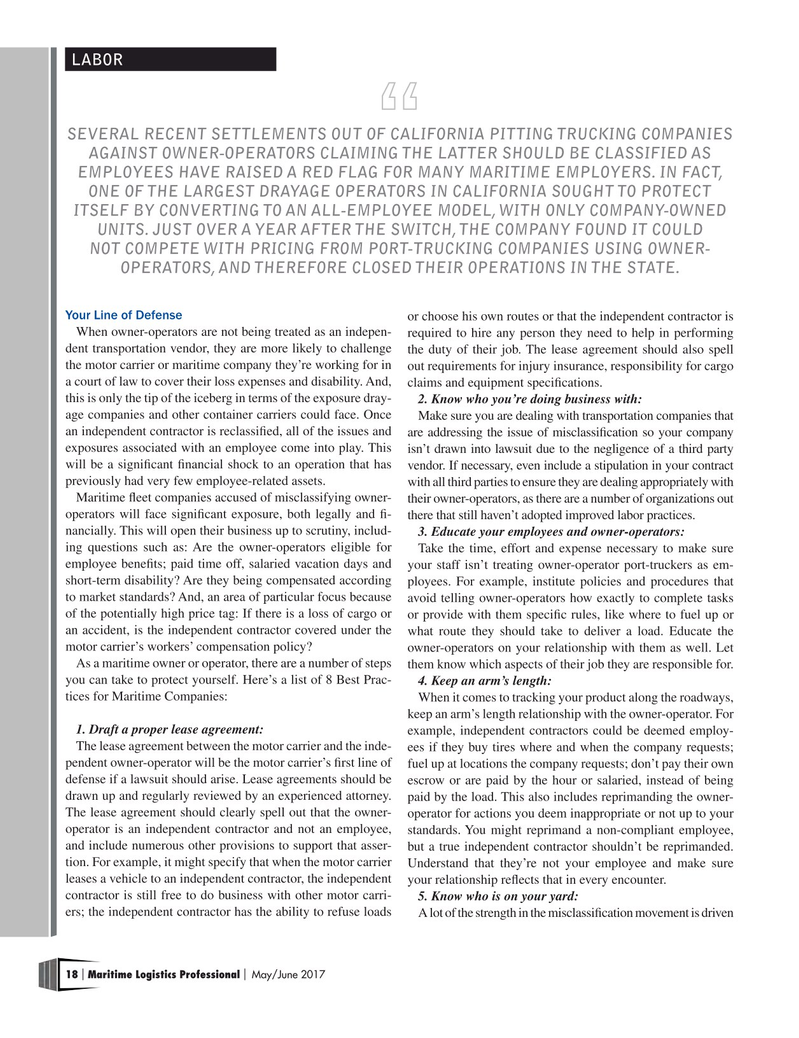
Page 18: of Maritime Logistics Professional Magazine (May/Jun 2017)
BUNKER OPERATIONS & PORTS
Read this page in Pdf, Flash or Html5 edition of May/Jun 2017 Maritime Logistics Professional Magazine
LABOR
SEVERAL RECENT SETTLEMENTS OUT OF CALIFORNIA PITTING TRUCKING COMPANIES
AGAINST OWNER-OPERATORS CLAIMING THE LATTER SHOULD BE CLASSIFIED AS
EMPLOYEES HAVE RAISED A RED FLAG FOR MANY MARITIME EMPLOYERS. IN FACT,
ONE OF THE LARGEST DRAYAGE OPERATORS IN CALIFORNIA SOUGHT TO PROTECT
ITSELF BY CONVERTING TO AN ALL-EMPLOYEE MODEL, WITH ONLY COMPANY-OWNED
UNITS. JUST OVER A YEAR AFTER THE SWITCH, THE COMPANY FOUND IT COULD
NOT COMPETE WITH PRICING FROM PORT-TRUCKING COMPANIES USING OWNER-
OPERATORS, AND THEREFORE CLOSED THEIR OPERATIONS IN THE STATE.
Your Line of Defense or choose his own routes or that the independent contractor is
When owner-operators are not being treated as an indepen- required to hire any person they need to help in performing dent transportation vendor, they are more likely to challenge the duty of their job. The lease agreement should also spell the motor carrier or maritime company they’re working for in out requirements for injury insurance, responsibility for cargo a court of law to cover their loss expenses and disability. And, claims and equipment specifcations. this is only the tip of the iceberg in terms of the exposure dray- 2. Know who you’re doing business with: age companies and other container carriers could face. Once Make sure you are dealing with transportation companies that an independent contractor is reclassifed, all of the issues and are addressing the issue of misclassifcation so your company exposures associated with an employee come into play. This isn’t drawn into lawsuit due to the negligence of a third party will be a signifcant fnancial shock to an operation that has vendor. If necessary, even include a stipulation in your contract previously had very few employee-related assets. with all third parties to ensure they are dealing appropriately with
Maritime feet companies accused of misclassifying owner- their owner-operators, as there are a number of organizations out operators will face signifcant exposure, both legally and f- there that still haven’t adopted improved labor practices. nancially. This will open their business up to scrutiny, includ- 3. Educate your employees and owner-operators: ing questions such as: Are the owner-operators eligible for Take the time, effort and expense necessary to make sure employee benefts; paid time off, salaried vacation days and your staff isn’t treating owner-operator port-truckers as em- short-term disability? Are they being compensated according ployees. For example, institute policies and procedures that to market standards? And, an area of particular focus because avoid telling owner-operators how exactly to complete tasks of the potentially high price tag: If there is a loss of cargo or or provide with them specifc rules, like where to fuel up or an accident, is the independent contractor covered under the what route they should take to deliver a load. Educate the motor carrier’s workers’ compensation policy? owner-operators on your relationship with them as well. Let
As a maritime owner or operator, there are a number of steps them know which aspects of their job they are responsible for. you can take to protect yourself. Here’s a list of 8 Best Prac- 4. Keep an arm’s length: tices for Maritime Companies: When it comes to tracking your product along the roadways, keep an arm’s length relationship with the owner-operator. For 1. Draft a proper lease agreement: example, independent contractors could be deemed employ-
The lease agreement between the motor carrier and the inde- ees if they buy tires where and when the company requests; pendent owner-operator will be the motor carrier’s frst line of fuel up at locations the company requests; don’t pay their own defense if a lawsuit should arise. Lease agreements should be escrow or are paid by the hour or salaried, instead of being drawn up and regularly reviewed by an experienced attorney. paid by the load. This also includes reprimanding the owner-
The lease agreement should clearly spell out that the owner- operator for actions you deem inappropriate or not up to your operator is an independent contractor and not an employee, standards. You might reprimand a non-compliant employee, and include numerous other provisions to support that asser- but a true independent contractor shouldn’t be reprimanded. tion. For example, it might specify that when the motor carrier Understand that they’re not your employee and make sure leases a vehicle to an independent contractor, the independent your relationship refects that in every encounter. contractor is still free to do business with other motor carri- 5. Know who is on your yard: ers; the independent contractor has the ability to refuse loads A lot of the strength in the misclassifcation movement is driven 18 Maritime Logistics Professional May/June 2017 | |

 17
17

 19
19
